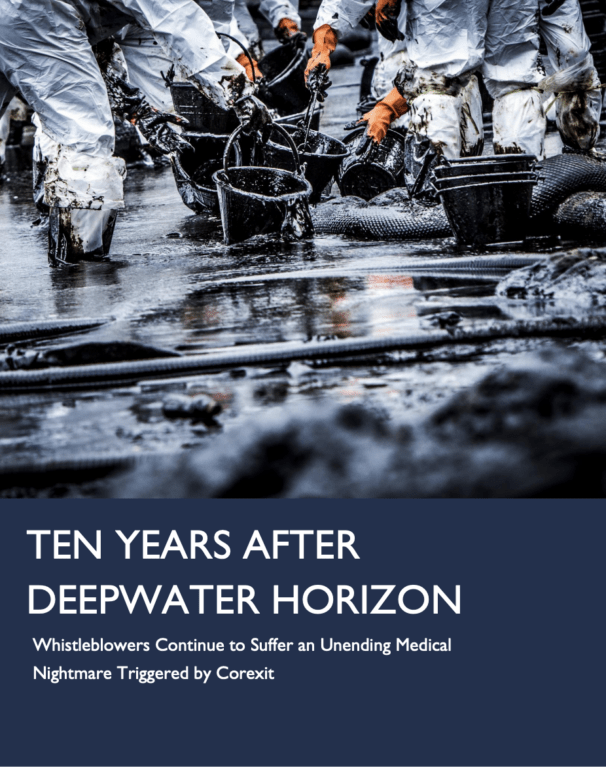BP Oil Spill Studies
Why sunlight matters for marine oil spills.
Why sunlight matters for marine oil spills. (Ward, Reddy & Overton) Apr 28, 2020
Read MoreHow the 2010 Deepwater Horizon spill reshaped our understanding of crude oil photochemical weathering at sea: a past, present, and future perspective.
How the 2010 Deepwater Horizon spill reshaped our understanding of crude oil photochemical weathering at sea: a past, present, and future perspective. (Ward & Overton) March 23, 2020
Read MoreTen years after Deepwater Horizon: Whistleblowers continue to suffer an unending medical nightmare triggered by Corexit (Government Accountability Project, 2020)
This report summarizes the ongoing issues of 18 witnesses who are still suffering the effects of the BP disaster. “On balance, the public health impacts identified in this third investigation continue to confirm an unacceptable conclusion: Corexit has caused the most gut-wrenching, sustained public health tragedies of any issue Government Accountability Project has investigated in…
Read MoreImplications of DNA damage and DNA repair on human diseases (Nelson & Dizdaroglu, 2020)
Link to Study
Read MoreDeepwater Horizon oil spill exposures and neurobehavioral function in GuLF study participants
Click here to view the full study. Abstract Introduction The 2010 Deepwater Horizon (DWH) disaster exposed tens of thousands of oil spill response and cleanup (OSRC) workers to hydrocarbons and other hazardous chemicals. Some hydrocarbons, such as toluene and hexane, have been found to have acute adverse effects on the central nervous system in occupational settings. However, no studies…
Read MoreEnvironmental disaster, pollution and infant health: Evidence from the Deepwater Horizon oil spill
View the Study Here Abstract In 2010 the Gulf Coast experienced the largest oil spill affecting U.S. waters in history. Evaporating crude oil and dispersant chemicals can cause major health problems. This paper examines the impact of the Deepwater Horizon oil spill on air quality and infant health outcomes. Using U.S. Environmental Protection Agency (EPA)…
Read MoreNeurological symptoms associated with oil spill response exposures: Results from the Deepwater Horizon Oil Spill Coast Guard Cohort Study
Click here to view the full study. Abstract Introduction The Deepwater Horizon (DWH) oil spill was the largest marine oil spill in U.S. history, involving the response of tens of thousands clean-up workers. Over 8500 United States Coast Guard personnel were deployed in response to the spill. Little is understood about the acute neurological effects of oil…
Read MoreBP Gulf Science Data Reveals Ineffectual Subsea Dispersant Injection for the Macondo Blowout
Click here to view the full study. After the Deepwater Horizon oil platform explosion, an estimated 172.2 million gallons of gas-saturated oil was discharged uncontrollably into the Gulf of Mexico, causing the largest deep-sea blowout in history. In an attempt to keep the oil submerged, massive quantities of the chemical dispersant Corexit® 9500 were deployed 1522 m deep…
Read MoreBP Gulf Science Data Reveals Ineffectual Subsea Dispersant Injection for the Macondo Blowout (Frontiers in Marine Science)
“After the Deepwater Horizon oil platform explosion, an estimated 172.2 million gallons of gas-saturated oil was discharged uncontrollably into the Gulf of Mexico, causing the largest deep-sea blowout in history. In an attempt to keep the oil submerged, massive quantities of the chemical dispersant Corexit® 9500 were deployed 1522 m deep at the gushing riser pipe of…
Read MoreDeepwater Horizon oil spill exposures and nonfatal myocardial infarction in the Gulf.
Click here to view the full study Abstract Background Workers involved in the response and clean-up of the 2010 Deepwater Horizon oil spill faced possible exposures to crude oil, burning oil, dispersants and other pollutants in addition to physical and emotional stress. These exposures may have increased risk of myocardial infarction (MI) among oil spill workers. Methods…
Read More
